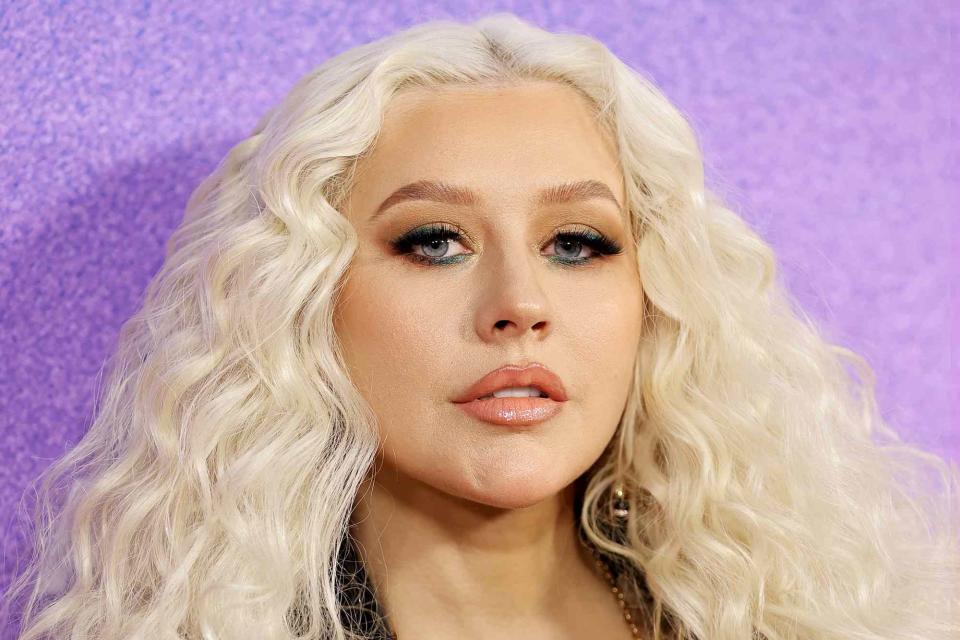Christina Aguilera's New 'Beautiful' Music Video Tackles the Downside of Social Media
The new video sheds light on the mental health effects of social media.

Christina Aguilera's 2002 hit song "Beautiful" remains an anthem of self love to many who grew up listening the powerful lyrics and Aguilera's unmistakable riffs. At the time of its release, Aguilera also dropped a music video featuring subjects that felt like outcasts for their differences, including a gay couple and a woman ripping up the pages of magazines. Now, 20 years later, Aguilera unveiled a new music video for the iconic song. This time, she uses it to shed light on the impact of social media on body image and mental health.
"We are Beautiful, no matter what they say ❤️," wrote Aguilera in the caption of an Instagram post announcing the revamped music video earlier this week. "A message I will always stand by and a message I prioritize to instill in my own children through every chapter of their lives," she continued.
"Today, it’s harder than ever to hear our own voice amongst so many others infiltrating our feeds and minds with mixed messaging...ultimately leading us to tune-out our own truth and self worth," wrote the pop star. "The original 'Beautiful' video set out to bring awareness and a sense of compassion in the face of judgment, criticism, and outside opinions. It still carries an important message to remember our core values outside of what’s being fed to us…to find a sense of balance and accepting ourselves for who we are."
:
The new music video aims to do just that through images of young girls practicing their makeup in front of a glowing ring light, looking at a vending machine of pills, and taking selfies. There are also clips of young boys comparing themselves to a muscular man in a gym and images of "before" and "after" photos of bodies that have seemingly undergone a transformation. It ends with the kids wiping off their makeup, dropping their weights, and going outside to play together.
Further driving home the point, the video ends with a text statement. "In the last 20 years, since Stripped was first released, social media has transformed our relationship with our bodies, and in turn, our mental health," it reads over a video of a smartphone seemingly bleeding. "Research suggests that time spent on social networking sites is associated with body image issues, self-harm, and disordered eating in children and teens," it continues. "This needs to change."
Finally, the video points viewers to Aguilera's website for mental health resources. Her site currently includes links to the International Mental Health Association, a nonprofit for mental health and wellness called Help Guide, and the Trans Lifeline, which provides trans peer support.
As Aguilera points out in the new music video, there is plenty of research that suggests social media impacts self image and mental health. For instance, 2021 findings link the initial roll-out of Facebook with a decline in mental health among college students, specifically due to the social comparison that the site fosters. And a 2019 article found an association between social media use and eating disorders among children and adolescents. Additionally, a 2020 systematic review of 16 papers found an association between social media and mental health issues, specifically anxiety and depression.
It's also worth noting that the suicide rate among 10- to 24-year-olds was stable from 2000 to 2007, but it has increased by 57 percent from 2007 to 2017, according to the Centers for Disease Control and Prevention. This increase occurred in the years when Facebook and other social media apps were released and grew in popularity.
:
TikTok is the latest social media app at the center of mental health research. Many studies are investigating the relationship between the two, such as a 2021 report that found TikTok use was tied to memory loss, anxiety, and depression.
While social media has the ability to connect people from around the world and gives many who wouldn't otherwise have a platform an opportunity to share ideas and creative content, it certainly has its downsides. If you're feeling nostalgic for pre-social media days, take a look at Aguilera's original "Beautiful" music video from a time when people were still dealing with self acceptance, just in different ways.
false

